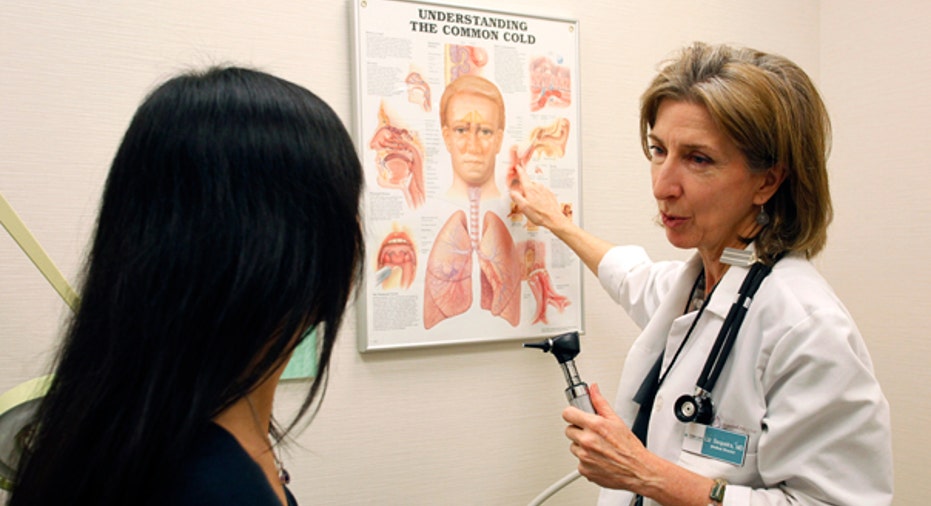Health Care is Going Mobile, Consumers Ready, Doctors Sill Leery

Got a cold, a weight problem or pain that won’t go away? There’s an app for that.
The surge in smartphone use is spilling over into the mobile health market with consumers using apps to maintain their health by using apps to do everything from check their blood pressure, log calorie intake and even monitor sugar levels. The trend has caught on, and doctors and hospitals are increasingly embracing mobile apps as an effective way to treat certain conditions.
“It’s a huge market. It’s gone from zero before the iPhone and other mobile devices launched to around a $700 million market,” says Chris Wasden, PwC’s global healthcare innovation leader. “Now hospitals are setting up their own app stores and you’ve got the [National Health Service] in the U.K. recommending doctors prescribe apps rather than have an office visit.”
According to a recent survey and study of the mobile health market (mHealth) for PwC Global Healthcare by the Economist Intelligence Unit, among consumers who use mHealth services, 59% report the services have replaced some doctor office visits.
Survey respondents ranked more convenient access to their health-care provider, the reduction of out-of-pocket health-care costs and having greater control over their health as the top three reasons to use mHealth.
Visit one of the mobile app stores and chances are you will quickly stumble on a mHealth app. According to Wasden, there are 12,000 mhealth apps on the market and number that is only expected to grow.
Some studies have shown apps to be more effective than more traditional treatments. According to a study commissioned by PwC, a clinical trial of the WellDoc diabetes management system has shown users of a diabetes management app see their sugar level decrease over a point and a half. By comparison, the FDA considers a new drug that is able to reduce sugar level by half a point as clinically significant.
“Diabetes won’t be solved with a pill. It’s a behavior problem,” says Wasden. “If you have a tool that transforms a patient’s behavior they will be more compliant regarding what they eat and what type of activity they do.” According to Wasden, 75% of all health-care costs are associated with chronic diseases like diabetes and obesity. If people change their behavior it eliminates the cost, he says.
Mhealth apps go beyond managing diseases. There are medical devices, including an EKG, that connect to your smartphone to check vitals and lenses that can detect skin cancer.
While medical apps are booming in popularity, their potential in the diagnosis and treatment processes are still just taking off. Experts say that in the future patients will be to talk to other apps and sensors will collect data from a user that can be sent to a doctor to monitor a condition. Even car makers are getting into the game: Wasden says some automobile companies are looking at how to use cars as health pods that passively collects biometric information like heart rate and blood-sugar level.
“Due to the influx of financial seed money and interest in mobile health, the market will only expand as developers jump on the opportunity to be part of a huge growth area,” says Peter Hudson, co-founder and chief executive of iTriage. “This in turn leads to innovation in the field.”
Experts admit that widespread adoption of mobile apps will take time, and the technology is facing some headwinds from some health care providers. According to the PWC survey, 64% of doctors and payers refer to the mHealth market as full of exciting possibilities, they also say there are too few proven business models. What’s more is only 27% of physicians encouraged patients to use mHealth applications, while 13% of physicians actually discouraged use. Close to half of doctors surveyed say they worried that mHealth will make patients too independent.
For consumers, this mobile health market means more power and control over their health at less cost. Just like technology disrupted the music and movie industries, mhealth shifts power to the consumer. The market will allow them to take a more active role in managing their health care, and provides 24/7 access to medical information and providers. And because these apps are so consumer driven, the future of apps will also be determined by the wants and needs of consumers.
“As a company in that space, we hear from consumers almost daily with ideas about how they'd like to see the application improved,” says Hudson. “So much of our product road map comes directly from consumers trying to solve their own health challenges around access and care.”



















